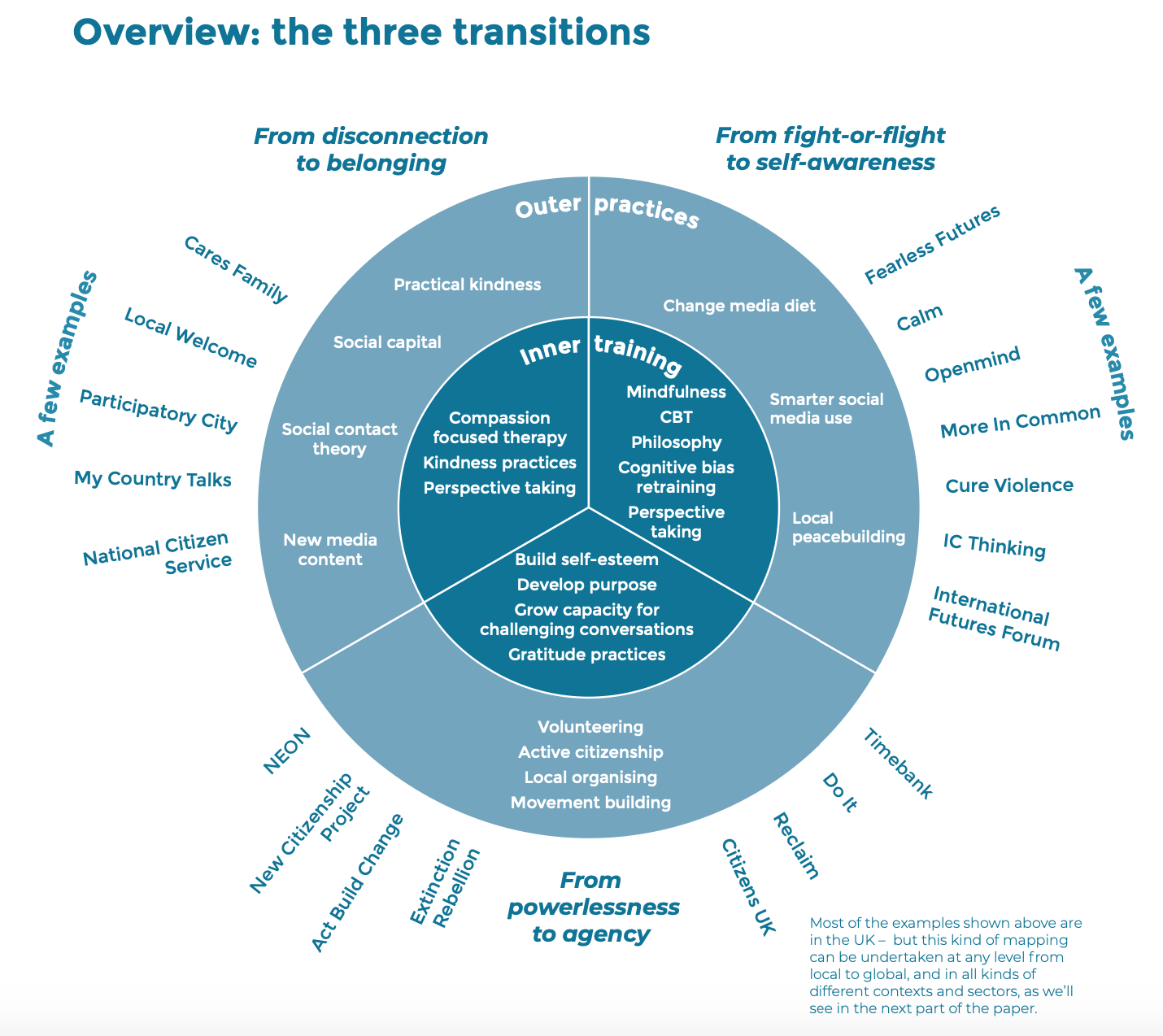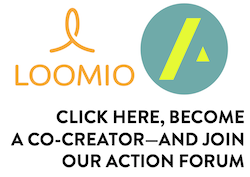Coronavirus can incite our “tend-and-befriend” nature, suggests Alex Evans - and Rutger Bregman shows it’s already happening
People hung banners reading "tutto andra bene", or "everything will be alright" across Italy as part of a show of solidarity on Saturday. From The Local Italy
Much talk this week about the UK government’s use of behavioural science - or nudge thinking - to anticipate people’s limited responses to safety measures against Coronavirus. The worry seems to be that people will soon start to “fatigue” with the harder prohibitions and bans - so reserve such measures closer to the peak of the epidemic.
The UK gov’s advice has already been challenged in an open letter from hundreds of behavioural scientists. They argue that lives are at risk, if these behavioural-fatigue considerations mean the spread of the virus is faster, because extreme “social distancing” is not advocated.
We have another take on how our Corona behaviours - maybe driven by more primary emotions - could be elicited in a direction that acts in the interests of the whole, not just selfishly.
Alex Evans’ work has been featured here before - particularly his Collective Psychology project - and in the piece below (originally on Global Dashboard), Alex applies his framework that encourages shifts towards “A Larger Us”.
Alex Evans: The collective psychology of coronavirus
Just like climate change or political tribalism, coronavirus asks us: do we see ourselves as part of A Larger Us, a them-and-us, or an atomised “I”?
Each of us is answering that question all the time right now. Do we hoard hand sanitiser, or leave enough for others? Do we observe social distancing protocols, or shrug and figure we’re young enough that the symptoms will be no big deal so why worry? Do we think we’re all in this together, or do we blame it on others (the Chinese, the Mexicans, the Americans)?
All this makes me think about the stuff I’ve been working on over the last couple of years in the Collective Psychology Project (CPP), which I set up in 2018 – and in particular the importance of whether we respond to perceived threats by going into fight-or-flight or tend-and-befriend mode.
Fight-or-flight – or more accurately, fight / flight / freeze – is a natural reaction to threat or feelings of overwhelm. But it’s not particularly helpful in the face of a collective threat like coronavirus. It’s a primal response, not a considered one. It focuses on the interests of the individual, not the collective. It reduces our capacity to empathise, and makes us more vulnerable to extremism or other hyper-tribal thinking. It leads to behaviours that push us apart.
With tend-and-befriend, on the other hand, we respond to danger by tending ourselves and our families, and befriending others so as to build dense social networks of mutual assistance. It’s a far more prosocial response to threat. It emphasises our interdependence with one another, and regards it as a source of strength rather than vulnerability. Where fight-or-flight zones out on the individual and pushes us apart, tend-and-befriend focuses on the collective and brings us together.
So what can help us into tend-and-befriend and out of fight-or-flight? In our work at CPP, we highlight three factors in particular: Agency, Belonging, and Conscious self-awareness, or ABC for short. Briefly,
Agency is about whether we feel like we have power to shape our lives;
Belonging is about whether we feel connected or alone; and
Conscious self-awareness is about whether we have the presence of mind to be able to choose how to react to the stuff that happens in our lives rather than our amygdala (the part of our brain that deals with threats) choosing for us.
All three are really relevant to coronavirus.
Shifts to agency, belonging and conscious self-awareness from A Larger Us
Start with agency. This is what what we’re really looking for when we fill our shopping trollies with enough to survive a zombie apocalypse: the sense of being able to do something to control our circumstances. (And actually, while panic buying is clearly bad, some calm, steady stocking up is good, in that it puts additional slack in the system. Read this great thread.)
But for the Larger Us version of agency, we need to go beyond stocking up our own personal bunker, and think about our communities. A lot of people in our communities – especially elderly people – are going to have a very hard time over the next couple of months. 80% of those with coronavirus will need to tough it out at home. Many more, like those with weak immune systems or existing conditions, will also need to self-isolate.
There’s a lot we can do to help them without compromising social distancing. Buying food or medicines. Cooking food if needed, and leaving it at the doorstep. Setting up systems for checking in on vulnerable people to make sure they’re OK.
Which brings us to belonging. Loneliness is terrible for health at the best of times; as bad for life expectancy as smoking 15 a day. Now imagine being an elderly person living alone and finding that not only are the grandchildren off limits for the next three months, but so are the ‘weak ties’ that constitute your day-to-day social contact: the GP, the postman, the person at the supermarket checkout.
Again, we can do a lot to allay this – and the boredom, anxiety, and grief that all of us may be about to face – by coming together. Now, before the tsunami hits, is exactly the right time to be reaching out to our neighbours, whether by email or with fliers or a poster on a lamp post, to set up a street level WhatsApp or Facebook group.
A month from now, when we’re at the peak, we may find that to be an incredibly valuable source of belonging: a platform to share news and memes to keep us sane, and to create a sense of shared identity that nurtures our sense of rootedness in the places where we live even when we can’t go out into them.
And then there’s conscious self-awareness – the one that tips the balance between fight-or-flight and tend-and-befriend. This is a deeply weird time. As Venkatesh Rao notes on Ribbonfarm, it’s one of those moments – like 9/11 or the fall of the Berlin Wall – when our master narrative is collapsing. Suddenly, everything is uncertain. With no story to guide us, we zone out on maths. (“Pantry stocks math. Alcohol percentage math. Infection risk math. Toilet paper math.”)
Amid such uncertainty, with no guiding story to fall back on, we’re prone to another kind of contagion besides the virus itself: infection with other people’s mental and emotional states. As yesterday’s market crashes showed, panic can ripple through our collective central nervous system as quickly as a murmuration of starlings changes course. More subtly, we can find (as I did last night) that a 3 hour Twitter information binge can leave you feeling depressed and edgy rather than informed and prepared.
So even as we care for others – and, in doing so, increase our own sense of agency and belonging – we need to look after ourselves. Everyone’s version of self-care is different. It might mean meditation. Time in nature. Eating healthily. Reading Stoic philosophy, or a Harry Potter novel. Yoga. Favourite music. Looking at the stars.
Conversely, don’t zone out on the news all day. Curate your social media feed to mute haters and panic spreaders. Try to defuse polarisation and fake news when you come across them.
All of us need to manage our mental and emotional states now more than ever. Not just for our own wellbeing, but also because our inner states end up affecting everything else around us. That’s the whole point about collective psychology: the state of the world affects our states of mind, and our states of mind affect the world. Coronavirus brings that fact into especially sharp relief.
As I noted at the end of the thread I did when CPP launched A Larger Us, all of us now own this challenge. None of this is going to be solved for us by a few expert practitioners. Because the truth is, all of us already *are* practitioners of collective psychology – whether consciously or otherwise.
So we’d better get good at it.
You’ll be up to speed with Alex if you follow him on Twitter: @alexevansuk
If you’re already a co-creator, click here. And if you can, please contribute!
An echo to Alex’s piece is this one, “Don’t forget: disasters and crises bring out the best in people”, from Rutger Bregman, author of Utopia for Realists. It appears in the UK version of the Dutch news start-up The Correspondent. An excerpt:
…For every antisocial jerk out there, there are thousands of doctors, cleaners and nurses working around the clock on our behalf. For every panicky hoarder shoving entire supermarket shelves into their cart, there are 10,000 people doing their best to prevent the virus from spreading further. In actual fact, we’re now seeing reports from China and Italy about how the crisis is bringing people closer together.
“We’ve learned how to accept help from others,” writes a woman living in Wuhan.“Because of this quarantine, we have bonded with and supported each other in ways that I’ve never experienced in nine years of living here.” Millions of Chinese people are encouraging each other to stand strong, using the Cantonese expression “jiayou” (“don’t give up”). YouTube videos show people in Wuhan singing from the windows of their homes, joined by numerous neighbours nearby, their voices rising in chorus and echoing amongst the soaring towers of Chinese cities. In Siena and Naples, both on complete lockdown, people are singing together from the balconies of their homes.
Wen Rui, a lighting engineer, has been living alone near a bridge in Wuhan for a month making sure its lights shine out with messages of hope, like “Stay Strong, Wuhan!” From Shine (China)
Children in Italy are writing “andrà tutto bene” (“everything will be all right”) on streets and walls, while countless neighbours are helping each other. On Thursday, an Italian journalist told the Guardian about what he had witnessed with his own eyes: “After a moment of panic in the population, there is now a new solidarity. In my community the drugstores bring groceries to people’s homes, and there is a group of volunteers that visit houses of people over 65.” A tour guide from Venice notes: “It’s human to be scared, but I don’t see panicking, nor acts of selfishness.”
The words “andrà tutto bene” – everything will be all right – were first used by a few mothers from the province of Puglia, who posted the slogan on Facebook. From there, it spread across the country, going viral almost as fast as the pandemic. The coronavirus isn’t the only contagion – kindness, hope and charity are spreading too.
The surge in solidarity that we’re seeing will come as no surprise to most sociologists. The current situation has obvious similarities to the human response to natural disasters, which has been researched extensively for decades.
News reports following a natural disaster are almost always dominated by stories of looting and violence, but in many cases such stories turn out to be unfounded speculations based on rumour. Since 1963, the University of Delaware’s Disaster Research Center has conducted nearly 700 field studies on floods and earthquakes, and on-site research reveals the same results every time: the vast majority of people stay calm and help each other. “Whatever the extent of the looting,” one sociologist notes, “it always pales in significance to the widespread altruism that leads to free and massive giving and sharing of goods and services.”’
…Believing these eyewitness accounts can be difficult, but that’s due mostly because of the cynical portrayal of human nature that’s taken centre stage in recent decades. For years and years, the worst aspects of humanity have dominated the discourse. “The point is, ladies and gentleman,” said Gordon Gekko, the main character in the 1987 film Wall Street, “that greed, for lack of a better word, is good. [...] Greed clarifies, cuts through, and captures the essence of the evolutionary spirit.”
Year after year, politicians have drafted huge piles of legislation on the assumption that most people are not good. And we know the consequences of that policy: inequality, loneliness and mistrust.
Despite all that, something extraordinary has happened in the last 20 years. Scientists all over the world, working in many different fields, have adopted a more hopeful view of human nature. “Too many economists and politicians model society on the constant struggle that they believe reigns supreme in nature, but that belief is based solely on projection,” writes prominent Dutch primatologist Frans de Waal. “Our assumptions about human nature are in dire need of a complete overhaul.”
Nothing is certain, but this crisis may well help us in that process. We may see a dawning awareness of dependence, community and solidarity. “I don’t know what you’re seeing,” a Dutch psychiatrist and mother tweeted, “but I’m seeing people wanting to help all over the place. By following official recommendations, or something practical like doing someone’s grocery shopping … ”
More here. If you want to keep tabs on what we might say is the inner-outer, I - We - World dimension of the Corona moment, this page from The Psychologist is constantly updating with new pieces and reports.




